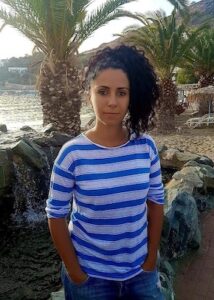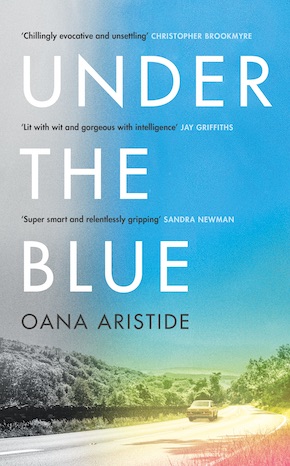Fiction and climate change
by Oana AristideOur dog used to have minor health issues, and so we often had to come up with inventive ways of giving her pills. Many a morning I had a soggy pill spat out in my face, Lumina the dog with her beady eye daring me to try that again. It was not tasty, it was weird, it was potentially broccoli. She did not want it.
I was the reluctant dog in the climate change discussion for a very long time. Being quite a logical person – or so I liked to think – I had many clever arguments against both acknowledging the problem and admitting responsibility. My sister was the first in my immediate surroundings to become despondent about the environment, but although she has a heart of gold, she has the diplomatic skills of a landslip. Her approach triggered all my defences. Some people may be virtuous and clear-sighted enough to immediately see past the excuses they might otherwise have come up with. Well, I was certainly not one of them. And later on, in frank discussions of the topic with friends, I noticed the same general process: it is painful to be told that you are doing something wrong, to accept responsibility for someone else’s suffering. We would rather not face up to things that are hurtful. That line of inquiry can even bring out aggression in us.
Writers are generally not the most feet-on-the-ground people, and one of the ways in which they practice levitation is believing that their novels will do all sorts of amazing things that novels rarely do. In my case, I hoped that I could make readers contemplate our collective attitude towards the rest of the world without triggering the defences such an approach would normally trigger. I wanted to make readers question the rights and the importance we give ourselves as humans, in contrast to those we confer on other living beings. To question assumptions so deeply held that we are not even aware of them, I wanted the reader to see ourselves as an alien might see us. From that vantage point, I hoped, we might be able to act in a spirit of objective fairness, and not just based on what is momentarily convenient. The general structure of my novel Under the Blue, and four of its six characters, were born out of the necessity to smuggle this point of view past the reader’s beady eye.
Another problem with having a moral agenda in a novel is that fiction has a very complicated relationship with truth. Truth is accustomed to being the most respectable person in the room, but in a novel is more or less a flasher, preposterously out of place. Exactly nobody reads novels so as to be lectured, and no amount of wishful thinking will change that. Using fiction to make a moral point is bit like taking a reader who absolutely does not want to be in a museum, to a museum. The reader has no interest in the exhibits, none whatsoever, and resents you for even suggesting that she should have a look. In a non-fiction setting, the argument is easily lost: you will make the case for going, the reader will refuse, end of story. But with fiction, within a sentence, the reader is no longer herself but a daydreaming Phoenician woman forming the clay pot on display in the museum. Defences are out the window, and for as long as the magic is upheld anything is possible.
I wanted to make readers question the rights and the importance we give ourselves as humans, in contrast to those we confer on other living beings. To question assumptions so deeply held that we are not even aware of them.”
This route to the reader’s heart has been taken since the beginnings of storytelling, and it remains the most effective way for a writer to provoke empathy; it might even be the historically most effective tool for societal change. But this approach runs into trouble when the characters are non-human. We as humans are capable of something like empathising with a tree, but what goes on in our hearts on that occasion is not the same as what goes on when we feel for a fellow human. Mostly, empathy takes root in a bed of familiarity, by showing the reader that really we are the same, that this person three thousand years ago is like us in her essential make-up. A tree or a frog or an ecosystem are not like us in that way, and I am not sure that pretending otherwise is helpful. That’s why I opted for a different approach, and tried to put the reader in the shoes of an objective observer of humanity. The emotional reaction I was after has to do with how we feel about ourselves.
The most popular example of fiction swaying public opinion is, I think, Uncle Tom’s Cabin. The novel is credited for having helped the abolitionist cause, and it might very well be the work of fiction that has done the most for reducing suffering in the world. But my favourite example is from opera, from La Traviata. I like it precisely because Violetta’s suffering didn’t change much but did a great job of illustrating how adept people are at holding contradictory beliefs. For almost a century, the audience of La Traviata was perfectly happy to empathise with Violetta the reformed courtesan, even to cry with her, and then to go out into the drawing rooms of the world and apply the same principles to societal interactions as those that made a tragedy out of la traviata. They seemed blind to the fact that the only villain in that opera is society, and that society is them.
I’m aware that by putting it so plainly I risk alienating readers. My interpretation of the process drags an unpalatable element of dishonesty into the storytelling process, and it is ironic that this explanation of how fiction engages morally with readers is itself perhaps in need of disguise, of being made more palatable. Maybe it’s a professional deformation (I was an economist before I was a novelist) to try and focus on what works rather than what is ideal, but I feel there is ample evidence that our core belief systems are mainly catering to our emotional needs. As I have tried to illustrate in Under the Blue, with an AI who struggles to make systematic sense of our morality, we as a species have built enormous intellectual edifices whose intrinsic purpose is to make us feel better, but whose declared, official intent is objective truth-seeking. We are moral creatures, and we want to be good. But we are also clever and will take any short cuts on offer. It is, again, ironic, that the effort we put into cheating our way to feeling good about ourselves is in itself an indication of how important feeling virtuous is to us.
To end climate change and environmental destruction we collectively need to perform a sharp U-turn. We know how difficult this will be to bring about by political diktat alone (not that there is any sign of that), without us feeling that the sacrifices required of us are justified. But this change is not beyond hope. It has happened before with slavery, and in many other instances of human history in which the circle of love and care was expanded. Novels and stories have always accompanied this process, and more often than not have been at its fore. So it follows that, should the belief in our own goodness be convincingly shaken – something a work of fiction might bring about – then we will adjust our actions. After all, it is abundantly clear that we really want to be good…
 Oana Aristide was born in Transylvania, to parents of Romanian, Greek and Yemeni background. After the fall of communism the family emigrated to Sweden. She has worked in the City of London as a macroeconomist, and as an advisor to the Romanian prime minister. In 2018 she took on the task of converting a heritage villa on the Greek island of Syros into a small hotel, and now divides her time between Syros and London. Her debut novel Under the Blue, a literary thriller about a pandemic, the rise of AI, and how – or why – we might save the human race, is published in hardback and eBook by Serpent’s Tail.
Oana Aristide was born in Transylvania, to parents of Romanian, Greek and Yemeni background. After the fall of communism the family emigrated to Sweden. She has worked in the City of London as a macroeconomist, and as an advisor to the Romanian prime minister. In 2018 she took on the task of converting a heritage villa on the Greek island of Syros into a small hotel, and now divides her time between Syros and London. Her debut novel Under the Blue, a literary thriller about a pandemic, the rise of AI, and how – or why – we might save the human race, is published in hardback and eBook by Serpent’s Tail.
Read more
@AristideOana
@serpentstail


